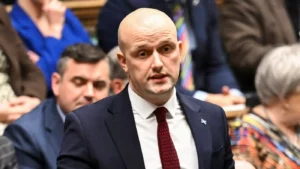UK Parliament ceasefire debate turns farcical amid condemnation of Israel war on Gaza

SNP leader at Westminster Stephen Flynn speaks in Parliament ahead of the debate on 21 February 2024
Oscar Rickett reports in Middle East Eye on 21 February 2024:
Scottish political leaders have condemned Israel for “ruthlessly exploiting” the principle of self-defence to “legitimise the slaughter of innocent civilians” in Gaza, as a UK parliamentary ceasefire debate descended into chaotic scenes on Wednesday.
The Scottish National Party (SNP), one of the opposition parties in the UK parliament, put forward a motion, which included condemnation of Israel for its “collective punishment” of the Palestinian people.
More than 29,000 Palestinians in Gaza have been killed during the Israel invasion, which came after the 7 October Hamas-led attacks that killed 1,140 people.
Brendan O’Hara, a Scottish National Party (SNP) MP, said the House of Commons had the chance to be on “the right side of history” by voting to end the violence as the party called for an immediate end to fighting. “No-one would deny that Israel has the right to defend itself… What no country has the right to do is to lay siege to a civilian population, carpet bomb densely inhabited areas, drive people from their homes, erase an entire civilian infrastructure, and impose collective punishment involving cutting off water, electricity, food and medicine from civilians.”
And SNP lawmaker Anum Qaisar highlighted the UK’s complicity in the war: “The F-35 bomber.. is being used [to bomb Gaza]. Parts for this fighter jet, the laser targeting system and the weapons release system are made in British factories,” Qaisar said. “It is morally corrupt and sickens me to my core that the UK continues to sell arms to Israel.”
But the debate and potential vote on whether Britain should join international demands for a truce unravelled, as procedural wrangling and a bitter split between opposition parties saw many lawmakers walk out in protest.
The leadership of the Labour Party, which is expected to win a general election due this year, felt uncomfortable at the motion’s mention of “collective punishment” by Israel. Faced with a likely rebellion by its MPs backing the SNP motion, Labour put forward its own amendment on Tuesday, which did not mention the phrase “collective punishment”. Instead it stated that “Israel cannot be expected to cease fighting if Hamas continues with violence”.
Lisa Nandy, Labour shadow minister for international development, said on Wednesday before the debate: “We’ve seen during the course of this conflict that many people have called for Israel to lay down their arms and for Hamas to be able to continue to fight.” The SNP motion made no such recommendation.
As the debate began at Wednesday lunchtime, parliamentary speaker Lindsay Hoyle said he would break with precedent and allow a vote on Labour’s amendment before the SNP’s motion, despite contradictory advice from officials. Separate Labour sources told Middle East Eye that Hoyle, who is also a Labour MP and who visited Israel in November, was told by senior figures in his party that if he did not allow a vote on Labour’s amendment, he “wouldn’t be speaker after the general election”. The party has denied the allegations.
Amid chaotic scenes, SNP and Conservative MPs left the House of Commons in protest. Hoyle later apologised, amid calls from the SNP’s Westminster leader Stephen Flynn for his resignation.
John McDonnell, Labour’s former shadow chancellor, told Middle East Eye that the Labour frontbench had been concerned that “if the government votes to defeat the Labour amendment, there will be a vote on the SNP motion”.
Parliament approved Labour’s call for an “immediate humanitarian ceasefire” without voting on it. Husam Zomlot, the Palestinian ambassador to the UK, said that the events marked “British politics at its worst”. “Politicians are trying to save themselves rather than saving an entire nation from genocide,” he told LBC.
Condemning Israel
While polls show that most Britons support backing a ceasefire in Gaza, the UK politicians have often shied away from this, preferring to emphasise Israel’s “right to defend itself”.
